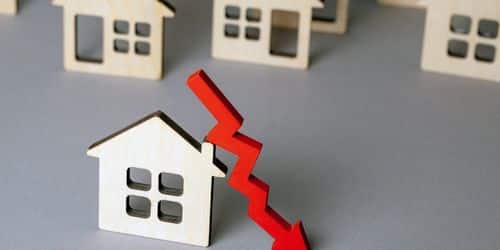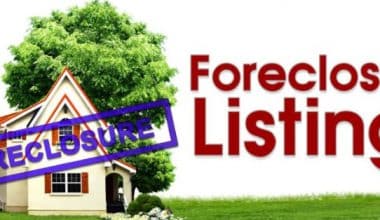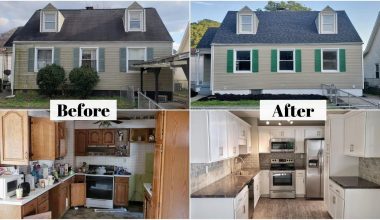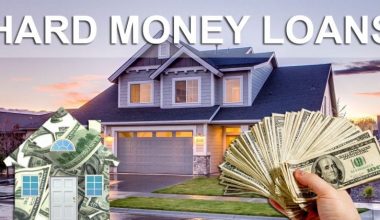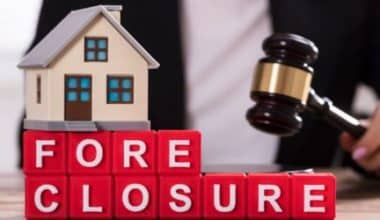Recessions can be frightening, and rightly so. When the economy experiences a large, sustained downturn, it often has a negative impact on your wallet, especially if you earn less than the median income. This is often most visible in your largest expense: housing.
It is not always clear what to expect. Housing market recession, for example, frequently result in lower home prices, which is great for homebuyers—until you consider job uncertainty and tightening lender restrictions. Knowing what might happen during in the 2023 housing market recession can help you prepare for it.
What Is a Housing Market Recession?
A housing market recession occurs when home sales fall for six consecutive months, which officially occurred in July 2022. According to new data from the National Association of Realtors (NAR), existing home sales were down 5.9% in July 2022 and 20.2% year on year.
According to NAR Chief Economist Lawrence Yun, “we’re witnessing a housing recession in terms of declining home sales and home building… but it’s not a recession in home prices.” Inventory remains scarce, and prices continue to rise across the country, with nearly 40% of homes [on the market] commanding full list price.”
What Is Causing This Apparent Housing Market Recession?
The housing market is being driven by two major forces: rising interest rates (due to recent Federal Reserve rate hikes) and rising construction costs. Many new buyers are hesitant to purchase a home in an environment with higher interest rates than we’ve seen in decades.
During the pandemic supply chain slowdowns, the cost of construction materials skyrocketed. Following the pandemic, these prices have not returned to normal, as widespread inflation has pushed up the cost of goods even further.
The combination of these two forces has driven many prospective home buyers out of the market.
It’s important to note at this point that media experts aren’t fortune tellers with clairvoyant abilities. While professionals do their best to predict what will happen based on available information, no one can predict what will happen in the future with certainty. This is why we need accurate inputs to track and forecast real estate movements.
Why Do House Prices Fall During Recessions?
House prices do not always fall during a recession, but they do frequently. According to Harvard University’s Joint Center for Housing Studies, housing prices have fallen in four of the five recessions since 1980.
Across all of those recessions, the average drop in house prices was 5% for each year the economy was in recession. In some cases, the drop was significant: during the Great Recession, the average home price fell by nearly 13%.
#1. Lender Restrictions are Being Tightened
People are more likely to lose their jobs during a recession, which can put a strain on your ability to repay a mortgage. As a result, during a recession, most lenders will tighten their mortgage requirements.
Note: Lenders try to reduce their risk by only lending to the most qualified applicants. To qualify, you may need a higher credit score, a larger down payment, or a more stable job situation.
#2. Homebuyers face less competition.
When times are tough, most people avoid making large financial commitments such as a 30-year mortgage that costs hundreds or thousands of dollars per month. The flow of homebuyers does not completely stop (not everyone is affected by a recession), but it does slow to a trickle.
Single-family home sales, for example, fell by 30% between 2005 and 2008. Prices fall when there is less demand for a product, according to the law of supply and demand.
#3. Rents are frequently kept high during recessions.
During most recessions, rental costs do the opposite of home purchase costs: they remain high or rise rather than fall. Because incomes tend to fall during a recession, your current rental costs may take a bigger bite out of your paycheck. This is why.
#4. Fewer people are interested in purchasing
During a recession, fewer people buy homes. People must still live somewhere, and unless you move in with someone for free or live on the street, your only other option is to rent. In other words, more would-be homeowners continue to rent.
#5. More Families Are Forced Into Foreclosure
One out of every five workers lost their job at the start of the Great Recession. Even after finding new jobs, people earned 18% less on average.
Financial difficulties like this are what drove more than six million Americans into foreclosure during the last recession. With a recent foreclosure on your credit, buying a new home is difficult or impossible, forcing more people to rent.
#6. Fewer houses are being built.
As fewer would-be homeowners enter the market, housing developers begin to reduce the number of new homes built. For example, during the Great Recession, new housing starts fell by 36%. People who prefer new homes, in particular, may have fewer options to choose from.
The Effects of 2022 Housing Market Recession on Homebuyers and Sellers
Buying a home during a recession can be beneficial if your personal financial situation allows it. You can distinguish yourself as a homebuyer by working to improve your credit, finding a stable job, and saving a large down payment. You may have more options (though fewer may be new homes), house prices may be lower, interest rates may be lower, and you may have more bargaining power. Because of these factors, recessions frequently turn into a buyer’s market.
If you’re selling a home, on the other hand, you may need to adjust your expectations in terms of how long it will take to sell your home and what concessions you’ll need to make to get a buyer. You can increase your chances of selling your home by not overpricing it and making it as appealing and move-in-ready as possible.
How Can a Real Housing Bubble Cause a Recession?
If lenders stop doing their due diligence to ensure that people can afford home loans, house prices may rise rapidly as more people compete to buy homes. If those homebuyers are unable to keep up with payments, a large number of people may default on their loans, causing a ripple effect throughout the economy.
Real Estate Movement Monitoring and Forecasting
To understand the impact of a housing market recession on the economy and vice versa, you must track real estate movements. How do you keep track of real estate transactions?
#1. Homebuilding Starts
Starts on new homes are a leading indicator of the real estate market. The Census Bureau recently issued some discouraging news. In July 2022, housing starts (new construction) fell 9.6%.
Because builders respond to housing demand, we must pay attention to this figure because it will have long-term implications for the real estate market. For example, what if interest rates fall and there is an insufficient supply of houses to meet demand?
#2. The mood index
According to the National Association of Home Builders (NAHB), homebuilder sentiment has been declining for eight months in a row, reaching 49 in August (a 6-point decrease). Anything less than 50 is regarded as negative. Because buyers and builders are struggling with rising costs, the index has fallen into negative territory for the first time since 2014. (aside from a brief plunge at the start of the pandemic).
#3. The number of home sales that were canceled
According to a new Redfin analysis, approximately 63,000 home purchase agreements were canceled in July 2022, accounting for approximately 16% of total home contracts for the month. Since the pandemic halted home sales in March and April of 2020, this is the highest percentage of cancellations.
Buyers are becoming more aware of their purchasing power as homes remain on the market for longer periods of time. Buyers are requesting additional repairs because they can now make conditional offers because they are no longer in such a hurry. Other buyers were unable to complete the transactions because they were no longer qualified for a mortgage due to rising interest rates. Homes were much more affordable, with interest rates around 3% versus 5%.
New home sales fell 9.6% in July 2022 as builders responded to a drop in demand for new projects.
#4. The National Association of Realtors data on existing home sales.
Since the National Association of Realtors announced that existing home sales were down 5.9% in July, many experts believe that a housing recession has officially begun.
The median existing-home sales price increased 10.8% year on year to $403,800. This is a $10,000 decrease from the previous month’s record high.
#5. The recent mortgage interest rates rise
What effect has the recent rise in mortgage interest rates had on the housing market? Many people have been priced out of the market because they no longer qualify for a mortgage or don’t want to be saddled with astronomical mortgage payments as a result of purchasing a house at an inflated price.
The House Price Index
According to recent NAR data, purchasing a home is the least affordable it has been in over three decades. In June, the housing affordability index reached 98.5, based on median single-family home prices, mortgage interest rates, and median family incomes. This is a 32.2% decrease from June 2021, and it is the lowest monthly score since 1989.
Housing affordability declines coincide with the highest inflation levels in over 40 years, making this real estate recession a serious concern.
The Housing Cycle
To understand the true significance of a housing market recession, we must examine the housing market’s cycle historically. The real estate cycle has four stages: recovery, expansion, hyper supply, and recession. Given that we are clearly in a recession, we must consider the next stage of the cycle.
What Happens After The Housing Market Recession In 2023?
We will enter a housing recovery cycle once the housing recession is over. This is the best time to purchase properties at below-market value. However, determining when this cycle has begun is not always simple.
How Quickly Will the Housing Market Recover After a Recession?
The housing cycle becomes complicated at this point due to the lingering effects of the recession, and many people are hesitant to invest in or purchase real estate. Of course, you’ll never know for certain when the recovery stage begins, but two key indicators are:
After bottoming out, real estate prices are rising; prices are rising from their lowest point.
The general economy is recovering, employment is increasing, and the economy appears to be doing well.
You also can’t deny the importance of government policies in stimulating the economy. This is why many experts are looking forward to the Fed’s interest rate announcement in September.
What Does the 2023 Housing Market Recession Imply?
The housing market recession in 2023 may require sellers to temper their expectations. You might not get the bidding war you hoped for, and high prices may turn off some potential buyers. Your home may be on the market for a longer period of time, and potential buyers may demand more repairs from you.
You must accept the reality of limited inventory and higher interest rates as a buyer. If you’re just looking for an investment, you might want to look into other asset classes because the uncertainty will last for an unknown amount of time.
Should You Purchase a Home During a Housing Market Recession?
We’ve discussed the idea of buying a home during a general recession, but what about a housing recession? With high-interest rates and rising construction costs, you may want to postpone purchasing real estate until the market stabilizes so that you are not locked into a higher interest rate on a home purchased above market.
However, if you notice that housing prices are falling and you have a sizable down payment for your home, you may want to take advantage of this once-in-a-lifetime opportunity.
Housing Market Recession FAQs
What happens to prices during a recession?
While individual item prices may behave erratically due to unexpected economic factors, it is true that a recession may cause some item prices to fall. Because a recession usually means that people have less disposable income, the demand for many items falls, causing them to become cheaper.
Are we headed for a recession in 2023?
“The entrenchment of inflation – and the likely policy action required of the Fed – confirms our forecast of a moderate recession beginning in the first quarter of 2023.”
What sells well in a recession?
- Clothing: Even during a recession, people require clothing because children do not stop growing! …
- Sweet stuffs: On a stressful day, everyone appreciates a chocolatey pick-me-up!
- Baby supplies.
- Pet care.
Related Articles
- How To Trade Forex During Recession?
- 9 Best Recession-Proof Businesses 2022
- HOUSING EXPENSE RATIO: What It & How To Calculate it
- Best Time To Buy a House In 2022
- What Is a BUSINESS CYCLE?- Definition, Internal and External Causes
